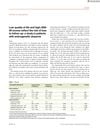 1 citations,
April 2022 in “Dermatologic Surgery”
1 citations,
April 2022 in “Dermatologic Surgery” The Progressive Loss Risk Scale is a system that shows the long-term risks of hair restoration surgery, which can change based on factors like age and transplant area.
 May 2022 in “Dermatologic Surgery”
May 2022 in “Dermatologic Surgery” Hair restoration surgery has a growing risk of hair loss over time.
 December 2024 in “Medicine”
December 2024 in “Medicine” Gut bacteria may affect hair loss risk.
 3 citations,
June 2006 in “Expert Review of Dermatology”
3 citations,
June 2006 in “Expert Review of Dermatology” The document concludes that hair loss is complex, affects many people, has limited treatments, and requires more research on its causes and psychological impact.
 March 2021 in “Journal of The European Academy of Dermatology and Venereology”
March 2021 in “Journal of The European Academy of Dermatology and Venereology” Low quality of life and high HSS-29 scores increase risk of losing patients during treatment.
 7 citations,
September 2020 in “Journal of Cosmetic Dermatology”
7 citations,
September 2020 in “Journal of Cosmetic Dermatology” Smoking increases early hair loss risk in men; quitting may help prevent it.
 14 citations,
March 2014 in “Journal of The European Academy of Dermatology and Venereology”
14 citations,
March 2014 in “Journal of The European Academy of Dermatology and Venereology” Young adults with hair loss face higher risk of stiff arteries.
 September 2023 in “Journal of movement disorders”
September 2023 in “Journal of movement disorders” Dopaminergic therapy in Parkinson's disease patients is linked to increased hair loss.

Most American men experience hair loss by age 50, with limited effective treatments available and new options not expected soon.
 48 citations,
May 2015 in “PLOS ONE”
48 citations,
May 2015 in “PLOS ONE” DNA variants can predict male pattern baldness, with higher risk scores increasing baldness likelihood.
January 2022 in “Aesthetic surgery journal” Extracellular vesicles may effectively treat hair loss with minimal side effects.
 August 2024 in “Clinical Cosmetic and Investigational Dermatology”
August 2024 in “Clinical Cosmetic and Investigational Dermatology” Hypothyroidism may cause certain types of hair loss.
 July 2011 in “Springer eBooks”
July 2011 in “Springer eBooks” The document concluded that FDA-approved treatments like minoxidil and finasteride are effective for hair loss, while the effectiveness of natural remedies and other non-approved treatments is not well-supported by evidence.
 32 citations,
February 2016 in “Journal of Dermatology”
32 citations,
February 2016 in “Journal of Dermatology” Dutasteride safely promotes hair growth and reduces hair loss, with mild side effects.
 2 citations,
January 2014 in “Springer eBooks”
2 citations,
January 2014 in “Springer eBooks” The book details skin conditions in older adults, their link to mental health, cancer treatment importance, hair loss remedies, and managing autoimmune and itchy skin.
 30 citations,
January 2014 in “Annals of Dermatology”
30 citations,
January 2014 in “Annals of Dermatology” Scalp dermatoscopy helps diagnose and monitor hair loss severity.
 10 citations,
February 2020 in “Endocrine”
10 citations,
February 2020 in “Endocrine” Finasteride safely treats hair loss without harming hormones or reproduction, but may slightly reduce sexual function.
 32 citations,
January 2005 in “Journal of The American Academy of Dermatology”
32 citations,
January 2005 in “Journal of The American Academy of Dermatology” Some babies are born with alopecia areata, and a treatment with clobetasol propionate can regrow hair in half of the cases.
 31 citations,
February 2016 in “American Journal of Men's Health”
31 citations,
February 2016 in “American Journal of Men's Health” Finasteride can cause serious emotional side effects; doctors should check patients' mental health history before prescribing.
 46 citations,
August 2019 in “Journal of Ethnopharmacology”
46 citations,
August 2019 in “Journal of Ethnopharmacology” Eclipta prostrata has many traditional uses and health benefits, but more research is needed to understand how it works and ensure it's safe.
 30 citations,
March 2001 in “Archives of Dermatology”
30 citations,
March 2001 in “Archives of Dermatology” Finasteride can cause one-sided breast enlargement, which disappears after stopping the drug.
 September 2003 in “Clinics in Family Practice”
September 2003 in “Clinics in Family Practice” Different hair diseases affect people during childbearing years, with treatments ranging from medication to psychological support.
 November 2020 in “Psychoneuroendocrinology”
November 2020 in “Psychoneuroendocrinology” Finasteride might affect memory by impacting cholinergic system.
 68 citations,
September 2018 in “Trends in Cell Biology”
68 citations,
September 2018 in “Trends in Cell Biology” Cancer can hijack the body's cell repair system to promote tumor growth, and targeting this process may improve cancer treatments.
 2 citations,
January 2018 in “Australasian Medical Journal”
2 citations,
January 2018 in “Australasian Medical Journal” Men with male pattern baldness have a higher chance of heart disease, especially if they're younger or have severe baldness; no link was found with another type of baldness called alopecia areata.
 29 citations,
February 2018 in “Genetics research international”
29 citations,
February 2018 in “Genetics research international” Certain genetic variations are linked to increased androgen levels in PCOS, but more research is needed to understand these connections fully.
 29 citations,
December 2016 in “The EMBO Journal”
29 citations,
December 2016 in “The EMBO Journal” Gata6 is important for protecting hair growth cells from DNA damage and keeping normal hair growth.
 14 citations,
June 2021 in “British journal of dermatology/British journal of dermatology, Supplement”
14 citations,
June 2021 in “British journal of dermatology/British journal of dermatology, Supplement” Experts agreed on guidelines to improve research on Frontal Fibrosing Alopecia.
 9 citations,
June 2002 in “Best Practice & Research in Clinical Obstetrics & Gynaecology”
9 citations,
June 2002 in “Best Practice & Research in Clinical Obstetrics & Gynaecology” Testosterone therapy can help women with androgen deficiency by improving energy, sex drive, and bone health with few side effects.
 1533 citations,
October 2008 in “Endocrine reviews”
1533 citations,
October 2008 in “Endocrine reviews” Mice without the vitamin D receptor have bone issues and other health problems, suggesting vitamin D is important for preventing various diseases in humans.





























